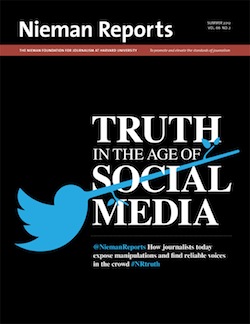

Editor’s Note: Our colleagues upstairs at Nieman Reports are out with their Summer 2012 issue, “Truth in the Age of Social Media,” which focuses on issues like verification, crowdsourcing, and citizen journalism. Over the next few days, we’ll give you a glimpse at some of their stories — but make sure to read the issue in full. In this piece, a conversation with the head of the nonprofit government watchdog group Citizens for Responsibility and Ethics in Washington.
 A lawyer who once was a federal prosecutor and counsel to powerful Congressional committees, Melanie Sloan now chases legal and ethical wrongdoing in Congress. As executive director of the nonprofit government watchdog group Citizens for Responsibility and Ethics in Washington (CREW), she frequently follows up on in-depth reporting in the media. Her team’s investigation of U.S. Representative Charles Rangel, a Democrat, for example, started with a story she read in The New York Times about the number of apartments he was renting in New York at below-market rates.
A lawyer who once was a federal prosecutor and counsel to powerful Congressional committees, Melanie Sloan now chases legal and ethical wrongdoing in Congress. As executive director of the nonprofit government watchdog group Citizens for Responsibility and Ethics in Washington (CREW), she frequently follows up on in-depth reporting in the media. Her team’s investigation of U.S. Representative Charles Rangel, a Democrat, for example, started with a story she read in The New York Times about the number of apartments he was renting in New York at below-market rates.
As her organization keeps an eye on abuses of power on both sides of the aisle, Sloan has also noticed that lobbyists have gotten more sophisticated in pushing their agendas. Nieman Reports’s Stefanie Friedhoff spoke with Sloan about how journalists are being deceived, how experts with no expertise end up in news articles, and why “he said, she said” reporting isn’t helping. Edited excerpts of the interview follow.
By CREW’s count, he has created more than 25 such groups and websites, all of which are “staffed” by those who work for his PR firm, with each employee holding any number of different positions. One Berman and Company staffer, for example, at one point served as the chief administrative officer of Berman and Company, senior economic analyst and senior research analyst with the Employment Policies Institute, government affairs director at the Center for Consumer Freedom, and director of state affairs, spokesperson and lobbyist for the American Beverage Institute, among others. Through these alleged public interest groups, Berman and his minions push their corporate sponsors’ views in the media and are regularly cited in news articles as “experts” on subjects ranging from labor law to drunken driving to childhood obesity. Their real, well-financed agenda is hidden from unsuspecting readers.
Photo of the U.S. Capitol Rotunda by ctj71081 used under a Creative Commons license.